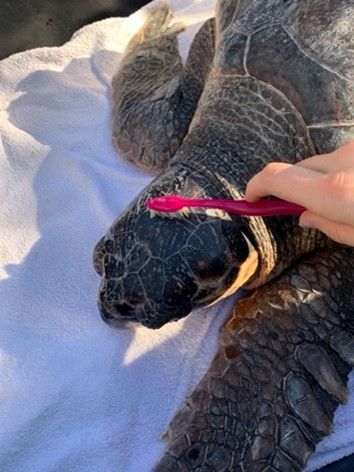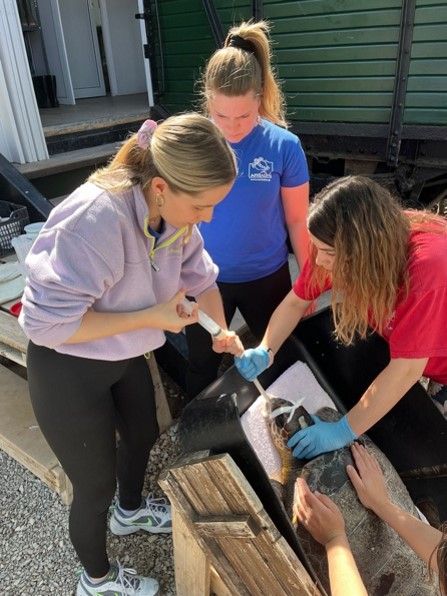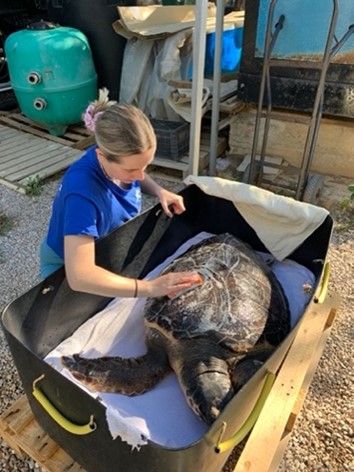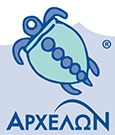Interview with a volunteer: Lea Heinen, Rescue Centre
Interview with a volunteer: Lea Heinen, Rescue Centre
“I think when a turtle starts to eat after a month of trying, when you can see the improvement or healing of a turtle's injury and when a turtle is released back into the sea, into its natural habitat, into its home - then you know that you are indeed saving turtles”

Who are you?
Hello, my name is Lea Heinen and I am from Luxembourg. I am 20 years old now and when I started the volunteering project, I was only 19 years old. Some people in Greece used to say I was still a child, which was kind of true.
How did you end up volunteering for ARCHELON?
After graduating from high school, I didn't really know what I wanted to do in life, what I wanted to study, where I wanted to go - no idea. Since I also had a lot of stress in my final year, I got to a point where I made a promise to take care of myself and do things I enjoy and give myself a break from studying. I decided to take a gap year. First, I worked and travelled and finally I applied to volunteer with ARCHELON through the European Solidarity Corps.
Why ARCHELON? Well, why not? I discovered working with sea turtles through a friend and I thought that would be cool. I did some research and came across a few volunteer projects with animals. I knew immediately that I wanted to apply to ARCHELON, and I did! I really liked the website and all the information I was given; this made my decision easier. You receive comprehensive information and as such are well prepared for your experience before you arrive and that was also one thing that put me at ease.

Did the project meet your expectations?
Although I had already received a lot of information, I was not sure how things would evolve or if my expectations would be met. I knew that I would go there for myself, to experience something new, to face challenges and to get out of my comfort zone for three months. When I first thought about working with ARCHELON, I expected that I would feed the turtles and maybe assist with treatments. I also tried to imagine what life would be like outside the Rescue Centre, whether I would make new friends and experience things with them. Finally, I didn't even have to worry about that as this special place brings together such extraordinary and kind people with big hearts. I didn't expect it to turn out so well! Already on the day of my arrival, everyone was so welcoming and nice to me. I made friends with everyone, among them some very good ones. We shared many beautiful moments, laughed together, cried together, and danced together. On the one hand it was hard work, but on the other hand it was so much fun because we worked as a team. I wasn't wrong about my idea of the work, it was mainly cleaning tanks and turtles, preparing food, feeding turtles, giving tours and in our last week we even got to assist with treatments or give injections ourselves. So, work was very varied, and every day was a little different which I enjoyed. Also, the location is perfect – you can go to Athens whenever you want, visit some Islands, or take the bus somewhere else.
What did you learn? What was unexpected? I have learned a lot, whether it was about turtles themselves or simply the different cultures and behaviors of fellow humans. Every aspect of the work was interesting, the thing that shocked me the most is that all the injuries to the animals were inflicted by humans. The main injuries are head and carapace injuries. Some turtles are missing flippers, and some have a lung infection. Some have had their heads smashed in with hammers or nails, and the carapace injuries are usually caused by a boat hitting them. The reason for the missing flippers is often fishing lines that simply cut off the flippers. Lung infections are caused by swallowing a hook or by possible head injuries, so that the turtles no longer find their natural way and stay too long in cold water. When I was there, we had a total of 25 turtles, two of them were missing a flipper, over half had a head and/or shell injury and some of them had lung infections. I have also learned that it is only the females that come out of the water to lay their eggs, otherwise they stay in the water. They come ashore at night, later in the evening or early in the morning. This is because it is quieter on the beaches, as there are people there during the day. Another reason is the sun, which would burn them on very hot days. As soon as the turtle is out of the water, she immediately starts digging her nest, which can be 1m deep. Then she lays about 115 eggs, out of those eggs usually about 70 will hatch. There are reasons for this: firstly, some hatchlings are too weak to make it out of the egg; secondly, not all of the eggs are fertilized.
But, for the successful hatchlings there are bigger concerns. One is that predators like birds will prey on them, if they catch them on their way to the sea. The other one is much more serious: In fact, the baby turtles find their way to the sea by moonlight, as they are attracted to bright reflections of the moonlight on the water surface. Nowadays, with all the bars, cafes, restaurants, and clubs along the beaches, many of the baby turtles are attracted by artificial lights, get confused and go in the wrong direction. It is only 1 in 1000 that makes it to adulthood. This means that the chances for them are very slim, and that's why I think the work that is done at the ARCHELON Rescue Centre is even more important!

What was the highlight of your journey with ARCHELON?
I think one of my most beautiful moments was when the turtle “Malebi” began to eat when I fed her. We tried many times and then one day she suddenly started eating and I kept cutting fish for her because she wouldn't stop eating. When I left the Rescue Centre, it was time to release her. I had tears in my eyes watching her swim away on the video my friends sent me! I think when a turtle starts to eat after a month of trying, when you can see the improvement or healing of a turtle's injury and when a turtle is released back into the sea, into its natural habitat, into its home - then you know that you are indeed saving turtles. I could go on and on with things I’ve learned but if you want to experience this, then you have to go there yourself! Trust me, you will have a great time, so you can also volunteer with ARCHELON here.
ATTENTION! Sea turtles are not pets: Do not touch them or feed them!
Kids Beach Competition 2023: Make your own little sea turtle with natural materials and send us a photo!
RECENT NEWS
- OUR NEWS24/02/2026
32 Years Returning to Nest: A Record Reproductive Lifespan for the Loggerhead Sea Turtle in Kyparissia Bay
When we analyzed the turtles’ codes, we realized that this was a turtle that had been tagged for the first time in the area 32 years ago! Specifically, turtle P4849 was tagged on July 7, 1993 and today is the turtle with the longest documented reproductive lifespan in Kyparissia Bay!
- OUR NEWS18/02/2026
"The Mediterranean We Protect" ARCHELON Presented the 2025 Results and the New LIFE MareNatura Exhibition
The presentation of our Accounts for 2025 was held with great success on Saturday, February 14th in Glyfada, honoring the people who are on the front lines for the protection of the Mediterranean.
- OUR NEWS11/02/2026
ARCHELON in the Lakonikos Bay: Nature, Research, Volunteering
The year 2025 was a milestone: a total of 1,253 nests were recorded and protected, while 7 female turtles were equipped with satellite transmitters, sending valuable data about their journeys across the Mediterranean.
- OUR NEWS23/01/2026
A turtle we treated 10 years ago was found in Spain!
“Castello” is a male Loggerhead turtle that was treated at our Rescue Centre in 2015. In 2025 he was found again at a Rescue Centre in Spain!
- OUR NEWS02/01/2026
Against All Odds: A Story of Marine Resilience from Amvrakikos Gulf
One turtle has been surviving for at least six years without a lower jaw!
- OUR NEWS29/12/2025
“Meetings with Remarkable Animals” A Heartwarming Reward for Our Efforts
Kristi Stassinopoulou shared with us a very personal moment: a sketch and a few pages from her book “Meetings with Remarkable Animals"
- OUR NEWS17/12/2025
ARCHELON’s Research: Expanding the Map of Mediterranean Green Turtles
In recent years, some green turtle nests have been recorded in Greece, indicating that the geographical spread of this species’ nesting areas in the Mediterranean is beginning to expand.
- OUR NEWS12/12/2025
The Power Behind Sea Turtle Conservation: Our 2025 Field Leaders
With deep gratitude, we honor all the Field Leaders who contributed to the success of the 2025 Field Projects.
- OUR NEWS10/12/2025
Unprecedented appearance of Leatherback Turtle on a Mediterranean beach
A new scientific record brings to light an extremely rare event for the marine life of the Mediterranean: the first confirmed appearance of an adult Leatherback Turtle (Dermochelys coriacea) attempting to nest in the Mediterranean basin.
- OUR NEWS08/12/2025
Applications Now Open for 2026 ARCHELON Field Leaders Posts!
ARCHELON is pleased to announce that applications are now open for the 2026 Field Leader positions across all nesting projects (applications open until January 31st).
- OUR NEWS05/12/2025
Saving Sea Turtles Together – A Tribute to Volunteers
On Volunteer Day, we take a moment to celebrate all those who came from near and far, put on the blue T-shirt, and embraced this important responsibility.
- OUR NEWS01/12/2025
Laganas Bay, Zakynthos: Successful Loggerhead Reproduction, Ongoing Habitat Problems
On the beaches of the Zakynthos National Marine Park, around 2,155 turtle nests successfully hatched thanks to active protection measures, but human pressures on coastal and marine habitats continue.
- OUR NEWS26/11/2025
A Second Chance: Two Loggerhead Sea Turtles Return to the Sea Thanks to Dedicated Rescues
This summer, two adult loggerhead sea turtles, ‘Aktaia’ and ‘Herbert’, arrived at ARCHELON’s Sea Turtle Rescue Centre needing urgent help after sustaining severe head injuries.
- OUR NEWS11/11/2025
Volunteering Projects 2026: Sea Turtles Need You, the Planet Needs Us!
ARCHELON welcomes volunteers from all over the world and of all ages (over 18) and no prior experience is required! If you speak English, are at least 18 years old, and are in good physical condition, you can do this!
- OUR NEWS10/11/2025
Outstanding Recognition for ARCHELON at the Effective Dialogue Conference 2025
On Thursday, November 6, 2025, ARCHELON received an honorary distinction for its substantial contribution to effective dialogue on sustainability, social responsibility, and the environment


